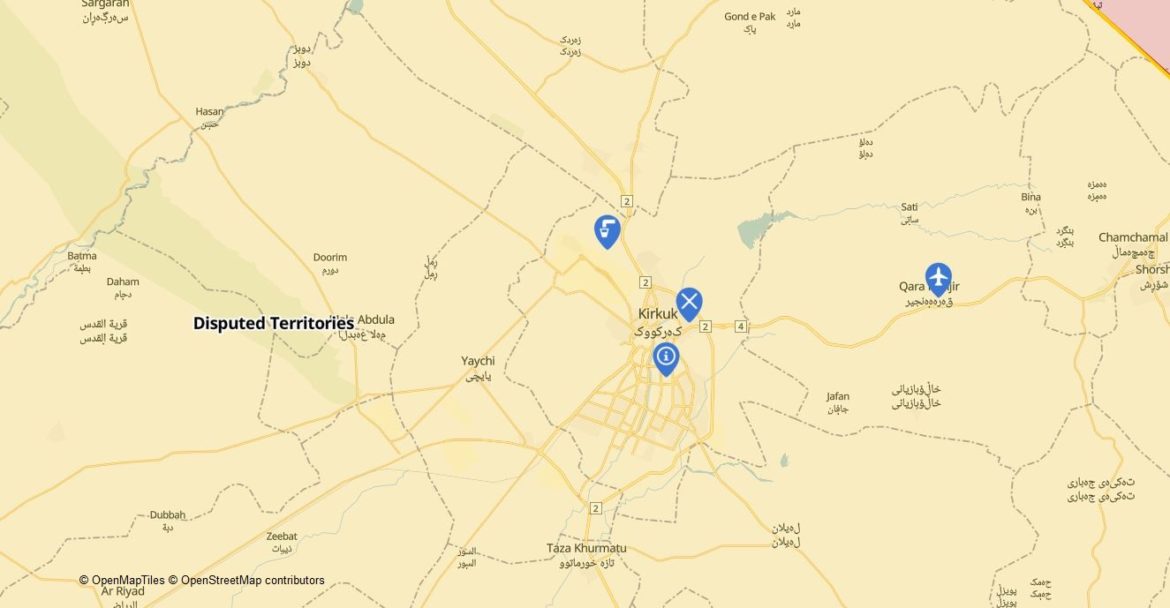1.3K
Kirkuk
- The Iraqi Ministry of Education officially informed all its provincial departments across the country “but Kurdistan Region” that failure to pass the Kurdish classes in high school will not be counted for the school year. A memorandum by the minister read:” The Ministry of Education does not consider the student failing in the Kurdish language class if a passing grade isn’t obtained.” Kurdish activists and public figures condemned it and considered it a step against Iraq’s Kurds.
- Since October 3, Iraqi army forces have been deployed in the streets of Kurdish neighborhoods without revealing the reasons. Locals expressed anger as the Kurdish areas became overwhelmingly militarized, causing concerns and panic among civilians.
- On October 4, Turkey’s National Intelligence Organization (MIT) Chief, Hakan Fidan, met with the Turkish-backed Turkmen Front in Erbil. The leader of the Turkmen Front, Hassan Turan, posted a picture of his meeting on social media without releasing details. Several Turkmen Front officials appeared in the meeting photos, including Ayden Marouf, Kurdistan’s Minister of the Region for Minorities Affairs. Since last year, Fidan has met with Turkmen and Sunni leaders on several occasions against laws of parties having ties with foreign governments.
- According to the State Organization for Marketing of Oil (SOMO), Kirkuk oil exports increased by 109% in September, totaling 2,319,732 barrels. SOMO statistics revealed that 2,169,180 barrels were exported from Kirkuk oil fields via the Cihan Pipeline, grossing 175,096,209 US dollars and averaging 80.72 per barrel. In August, Kirkuk exported 1,109,825 million barrels.
- Two high-level committees have been formed by the Iraqi Ministry of Defense and the Peshmerga Ministry to investigate the drones that flew over Peshmerga forces in the Qarahanjir district weeks ago. So far, neither committee has reached any conclusions. On September 19-20, four drones hovered for 20 minutes, including monitoring the bases of the Peshmerga forces.
- On October 7, the security forces announced the killing of a terrorist named Mohammed Muzri Mohammed (Abu Mustafa), the deputy military chief of ISIS (Da’esh) in Kirkuk. According to a statement by the Security Cell, the terrorist was killed in a “special operation in Wadi Zghetun, south of Kirkuk.”
- On October 5, the security forces raided Kirkuk’s Department of Tax and arrested its director, Saad Razwan. His arrest comes a day after a female tax employee was arrested while accepting a bribe and later confessed that the bribe was for the director.
Khanaqin
- Khanaqin Education Department announced the closure of 25 Kurdish-language schools in 2020 and 2021 due to the decline in the number of Kurdish students. Kurdish education is declining in the “Disputed Territories” due to Baghdad’s lack of support, such as hiring teachers and allocating supplies. The lack of a Kurdish college also makes students switch to Arabic schools. Separately, the head of the office of the “Disputed Territories” of the Kurdistan Regional Government (KRG), Rawa Salim, warned of a “New Arabization” in Khanaqin. Salim said:” More than 500 families in Diyala province have transferred their registration to Khanaqin district in the past two years.”
Shingal (Sinjar)
- On October 2, the United Nations Investigative Team for the Promotion of Accountability for Crimes Committed by Da’esh (UNITAD) met with the Iraqi Martyrs Agency and agreed to excavate several more mass graves in Sinjar. The agreement affirms the excavation of the mass graves in the presence of international organizations and investigators. Many victims of the Da’esh Genocide against the Yazidis in 2014 remain unidentified. Separately, on October 6, Turkish drones struck the Sinjar Resistance Units (YBS) near mount Sinjar. No casualties have been reported.

